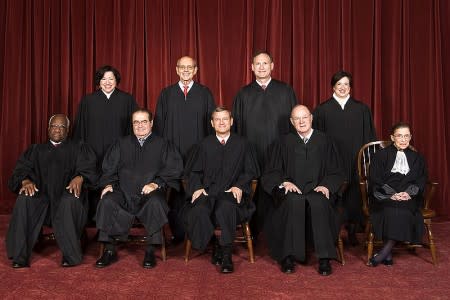Supreme Court rules that Aereo is illegal
In a sweeping opinion on Wednesday, the Supreme Court ruled in a 6-3 decision that the fledgling TV service Aereo violated copyright laws, in a big victory for television networks. The Justices said the cloud computing business is unaffected by the decision.
Link: Read The Decision in American Broadcasting Companies, Inc. vs. Aereo, Inc
The ruling effectively ends Aereo as a viable business model, even though the Court had remanded the case back to a lower court.
“Aereo performs petitioners’ works publicly within the meaning of the Transmit Clause,” said Justice Stephen Breyer, writing for the majority.
“We must decide whether respondent Aereo, Inc., infringes this exclusive right by selling its subscribers a technologically complex service that allows them to watch television programs over the Internet at about the same time as the programs are broadcast over the air. We conclude that it does,” Breyer said.
“The proper course is not to bend and twist the [Copyright] Act’s terms in an effort to produce a just outcome, but to apply the law as it stands and leave to Congress the task of deciding whether the Copyright Act needs an upgrade,” said Justice Antonin Scalia in his dissent.
The case involves a copyright battle between Aereo, a tech TV startup, and the major television networks that could affect the future of broadcast television and cloud computing.
Aereo provides a paid service used by people with computers, and it allows customers to watch broadcast TV programs on a computer that are also available for free over the airwaves – without compensation to the broadcasters.
Some TV networks had hinted they would pull their free broadcast signals if they lost the case, or greatly reduce the amount of programming offered over the free airwaves.
The TV networks were deeply upset that Aereo could set a precedent that will erode their revenue models, which depend on retransmission fees and contracts with sports organizations.
In March, Aereo’s lawyers hadinjected the idea into the debate that a ruling against it would also set a precedent that could shut down the huge cloud computing industry, where digital content is stored remotely and retrieved by computer users. But the Court didn’t rule on the application of Aereo’s business model to the cloud computing industry, saying the Court should wait until and if a specific case about cloud computing and remote storage comes before it.
Recent Stories on Constitution Daily
Supreme Court issues historic ruling to protect your cellphone rights
Video: Lawyers who argued the Riley cellphone case at the National Constitution Center



